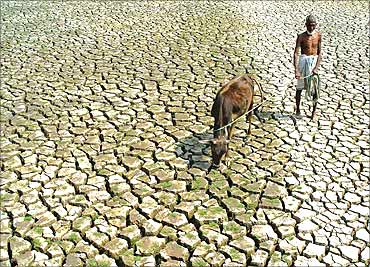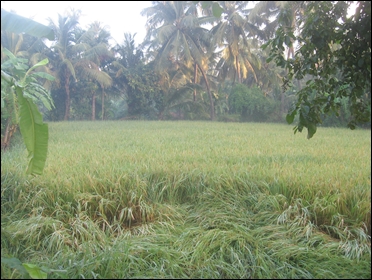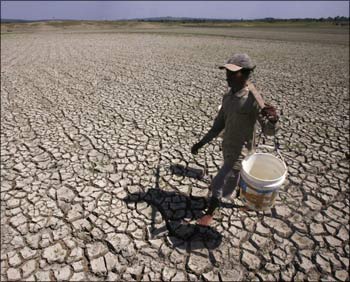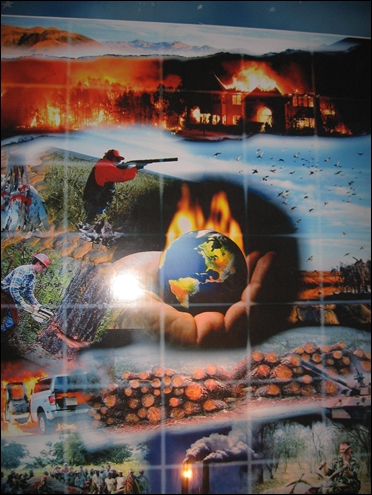Image: An farmer walks with his hungry cow through a parched paddy field in Agartala.
Photographs: Reuters.
Photographs: Reuters.
The Earth will be 2.4 degree Celsius warmer by 2020 if the world continues with the business-as-usual approach to climate change and India would be one of the hardest hit countries witnessing up to 30 per cent reduction in crop yields, a new study has claimed. The rising temperatures will adversely affect the world's food production and India would be the hardest hit, according to the analysis by the Universal Ecological Fund (FEU-US), the US subsidiary of FEU founded in Argentina in 1990.
Climate 2020: India to be hardest hit
Image: Climate change to hit paddy yield.
The report titled 'The Food Gap -- The Impacts of Climate Change on Food Production: A 2020 Perspective' predicted that crop yield in India, the second largest world producer of rice and wheat, would fall up to 30 per cent by the end of this decade. The report, however, noted that the impacts of climate change would vary from region to region. While central and southern region would witness adverse impacts, the impacts could be beneficial for East and South-East Asia, the report predicted.
Climate 2020: India to be hardest hit
Image: Food production to be hit.The two most populated countries in the world, India and China, would experience different impacts.
While India could see a fall in its crop yield, China -- the largest producer of rice and wheat in the world -- is expected to increase its crop yields up to 20 per cent, said the report. However, the overall impact of a warmer planet on global would be massive, said the report, adding that the most significant impacts would be on the top 20 producers of each of the four crops: wheat, rice, maize and soybean, respectively.
Climate 2020: India to be hardest hit
Image: Wheat production to fall.
It has predicted that global wheat production during that time would experience a 14 per cent deficit between production and demand; while there will be an 11 per cent deficit in rice production and 9 per cent in maize (corn) production. Soybean is the only crop showing an increase in global production, with an estimated 5 per cent surplus, the report said. "The evidence that man-made greenhouse gases would cause the temperature of the planet to rise has been available for almost two decades.
Climate 2020: India to be hardest hit
Image: Earth's warming is man-made.
The IPCC (Intergovernmental Panel on Climate Change) Fourth Assessment Report (2007) has concluded that, unequivocally, the Earth's warming is anthropogenic (man-made)," said FEU scientific adviser Dr Osvaldo Canziani, the former Co-Chair of Working Group II of the IPCC. The analysis and data utilised to produce the report is based on key documents already published by the IPCC and other UN agencies.
Climate 2020: India to be hardest hit
Image: Protect the planet.
"The key to our report was to analyse, synthesise and update published documents and data from disparate sources and present it in an accessible way," Liliana Hisas, Executive Director of FEU-US and author of the report, said. "The analysis is based on the conclusions of the 2007 IPCC Fourth Assessment Report. Our other guiding principles were using the business-as-usual path the world is currently following, and assess the impacts of climate change with a short-term target of one decade".
Climate 2020: India to be hardest hit
Image: Extreme weather to hit people across the world.
Other important findings of the analysis were that the level of carbon dioxide would reach 410 ppm by 2010 based on the current increase rates of about 0.5 per cent a year. This level of greenhouse gas (GHG) concentration equals a 2.4C increase in global temperature. The Advisory Group of Greenhouse Gases (AGGG) determined, in 1986, that an increase of 2C above pre-industrial times would be dangerous. "Over the entire world, extreme weather and climate events would be registered. Further increases in global mean surface temperature will exacerbate the intensity of these events", added Dr Canziani.








article